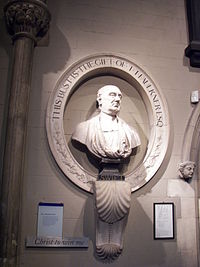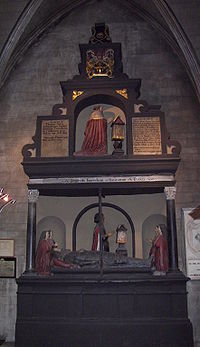- Deans of St. Patrick's Cathedral, Dublin
-
 Bust of Jonathan Swift, the cathedral's most well-known dean.
Bust of Jonathan Swift, the cathedral's most well-known dean.
 Cathedral memorial to 16th century dean, Thomas Jones.
Cathedral memorial to 16th century dean, Thomas Jones.
The Dean of St. Patrick's Cathedral is the head of St. Patrick's Cathedral, Dublin, elected by the Chapter of the cathedral. The office was created in 1219 or 1220, by one of several charters granted to the cathedral by Archbishop Henry de Loundres between 1218 and 1220.
For centuries, the Dean of St. Patrick's was the only Dean in Dublin, and documents of those years often refer to him as the Dean of Dublin - but from around 1539, there was also the office of Dean of Christ Church Cathedral, which had been a Priory, headed by a Prior and Canons.
Contents
Election
The right to elect the Dean of St. Patrick's is vested exclusively in the Chapter of the Cathedral (though pre-1870, there could be an exception where a vacancy occurred due to promotion of the Dean to the office of a Bishop), and has been defended against monarchs and even the Pope. The Archbishop of Dublin has one of the 28 seats (the Dean plus 3 other dignities plus 24 canons), used only at the time of election, but no other special authority.
Holders of the office of Dean
The following have served as deans (where they are known to have previously held office at the cathedral, this is noted):
Pre-Reformation
- 1219-c.1238 - William FitzGuido, first Dean, appointed by Archbishop Henry de Loundres
- c.1238-c.1250 - Richard Gardiner
- c.1250-1275 - Richard de St. Martin, a sitting prebendary
- 1275-1284 - John de Saunford, Franciscan, Prebendary of Howth; later Archbishop of Dublin (his brother had earlier held that office)
- 1284-1311 - Thomas de Chaddesworth or Chadsworth, Chancellor
- 1311-c.1338 - William Rodyard, Treasurer; later, first Chancellor of the first University authorised for Dublin
- c.1338-1347 - Thomas de Montpelier, Prebendary of Lusk
- 1347-1349 - Adan de Kingston (?)
- 1349-1350 - Matthew Brissele
- 1350-1353 - John de Brienne
- 1353-1374 - William de Bromley, Prebendary of Lusk; also Chancellor of the Exchequer, Treasurer of Ireland and Keeper of the Great Seal
- 1374-1382 - John Colton; became Archbishop of Armagh in 1382
- 1382-1391 - Henry Bowett, papal chaplain; became Bishop of Bath and Wells in 1401 and was Archbishop of York from 1407-1423
- 1391-1401 - Thomas de Everdon, a sitting prebendary; Keeper of the Rolls for Ireland.
In this period, the Pope attempted to assume the power to appoint the Dean, nominating one Landulph, Cardinal of St. Nicholas. The King of England resisted this, and it was eventually conceded that the Chapter alone could choose the Dean - but see the 1401 appointment.
- 1401-1428 - John Prene, appointed by Pope Boniface IX in breach of the Chapter's right of election but confirmed by the King in London after the dispute on rights was settled.
- 1428-1457 - Nicholas Hill, Archeacon of Dublin
- 1457-1466 - Philip Norris, Prebendary of Yagoe; excommunicated by the Pope for attacks on mendicant friars
- 1466-1506 - John Alleyne, Precentor
- 1506-1522 - Thomas Rochfort, Precentor
- 1522-1527 - John Rycardes
- 1527-1528 - Robert Sutton, Archdeacon of Dublin
- 1528-1529 - Thomas D'Arcy, Prebendary of Howth; Master of the Rolls
- 1529-1537 - Geoffrey Fyche, Treasurer
Post-Reformation to Disestablishment
The Reformation took effect in Ireland following a hiatus in the office of Archbishop of Dublin after the death of Archbishop Alen in 1534, and the election of George Browne to that office by the Chapters of both Cathedrals under pressure from King Henry VIII.
- 1537-1547 - Edward Bassenet, a sitting prebendary, for whose election pressure was exerted by the State, Archbishop George Browne writing to the King that the Chapter had elected him "only in respect of your Grace's desire"
From 1547 to 1555, St. Patrick's was suppressed as a Foundation, reduced to the status of a parish church, without its Chapter or Dean - the Dean and other senior officials being pensioned off by the King.
- 1555-1560 - Thomas Leverous, appointed by Queen Mary, formerly tutor to the powerful FitzGerald family; became Bishop of Kildare, and was one of the two Irish Bishops to refuse to take the Oath of Supremacy, after which he ran a school in Adare
- 1560-1565 - Alexander Craike, Prebendary of Clonmethan; became Bishop of Kildare
- 1565-1567 - Adam Loftus, also Archbishop of Armagh, then resigned to become Archbishop of Dublin; later first Provost of Trinity College Dublin; died 1605
- 1567-1573 - Robert Weston, a layman, also Chancellor of Ireland and Dean of Wells
- 1573-1581 - Sir William Gerard, a layman and also Chancellor of Ireland (a contemporary wrote that he "confessed how greatly he had been tormented in conscience with keeping the deanery"
- 1581-1585 - Thomas Jones, Chancellor; later Bishop of Meath and then Archbishop of Dublin
- 1585-1597 - Richard Meredyth, who became Bishop of Leighlin
- 1597-1608 - John Ryder, who became Bishop of Killaloe
- 1608-1625 - Thomas Moigne, Prebendary of Monmohenock; became Bishop of Kilmore and Ardagh
- 1625-1649 - Benjamin Culme, Prebendary of Mulhuddart
1649-1660 - office vacant during period of Parliamentary governance; a Robert Chambers was appointed "Reader at St. Patrick's" following Dean Culme's retirement
- 1660-1666 - William Fuller, who became Bishop of Limerick and later of Bishop of Lincoln, and who composed an anthem for the Restoration in Ireland, celebrated on 27 January 1660 with the consecration at the cathedral of twelve bishops
- 1666 - 1675 - Thomas Seele, Chancellor; Fellow, and later Provost, of Trinity College Dublin
- 1675-1678 - Benjamin Parry, Prebendary of Castleknock; became Bishop of Ossory
- 1678-1689 - John Worth, Chancellor
- 1689-1691 - William King, Chancellor, became Bishop of Derry, later Archbishop of Dublin, Lord Justice; (1650-1729)
- 1691-1694 - Michael Jephson, previously Chancellor of Christ Church Cathedral
- 1694-1696 - Thomas Lindsay, became Bishop of Killaloe, Bishop of Raphoe, and then Archbishop of Armagh
- 1696-1699- Edward Smyth, Fellow of Trinity College Dublin and Chaplain to King William III; became Vice-Chancellor of the University of Dublin and later Bishop of Down and Connor
- 1699-1705 - Jerome Ryves, previously Chancellor of Christ Church Cathedral
- 1705-1713 - John Stearne, Chancellor, rebuilt Dean's house in 1713; became Bishop of Dromore, and later of Clogher, and appointed Vice-Chancellor of the University of Dublin in 1721
- 1713-1745 - Jonathan Swift, Prebendary of Dunlavin, the famous writer
- 1745-1747 - Gabriel James Maturin, Prebendary of Mulhuddart
- 1747-1775 - Francis Corbet, Treasurer
- 1775-1794 - William Cradock, Prebendary of St. Audoen's
- 1794 - Robert Fowler, later (1813), Bishop of Ossory
- 1794-1810 - James Verschoyle, previously a Minor Canon, Vicar-Choral, Prebendary, Archdeacon of Glendalough and Precentor; later, Bishop of Killala and Achonry
- 1810-1818 - John William Keatinge, last Chaplain to the Irish House of Commons
- 1818-1828 - Richard Ponsonby, Precentor; later Bishop of Killaloe, then of Derry
- 1828-1842 - Henry Richard Dawson, oversaw both some renovation of the building, and reorganisation of worship
- 1842-1842 - Robert Daly, Prebendary of Stagonil; election subsequently contested; later Bishop of Cashel
- 1843-1864 - Henry Pakenham
Note that from 1846 to 1872, the office of Dean of Christ Church was united to that of Dean of St. Patrick's.
- 1864-1889 - John West, Archdeacon of Dublin
Post-Disestablishment
- 1889-1901 - Henry Jellett, Predbendary of Tymothan and Archdeacon of Cloyne
- 1902-1911 - John Henry Bernard, Treasurer, later Bishop of Ossory, then Archbishop of Dublin and Provost of Trinity College, Dublin
- 1911-1924 - Charles Thomas Ovenden, Prebendary of Monmohenock
- 1924-1933 - Hugh Jackson Lawlor, formerly Professor of Ecclesiastical History, Trinity College, Dublin
- 1933-1935 - Thomas Arnold Harvey, later Bishop of Cashel
- 1935-1950 - David Frederick Ruddell Wilson
- 1950-1968 - William Cecil De Pauley
- 1958-1968 - John Ward Armstrong, later Archbishop of Armagh
- 1969-1991 - Victor Gilbert Benjamin Griffin
- 1991-1999 - Maurice Evan Stewart
- 1999-present - Robert MacCarthy, (current dean at August 2007)
Sources
- London, G. Bell and Sons, 1924: St. Patrick's Cathedral Dublin; Bernard, J.H., former Dean of St. Patrick's, later Provost of Trinity College Dublin and Archbishop of Dublin
References
Categories:- Church of Ireland deans
- Anglican deans
Wikimedia Foundation. 2010.
